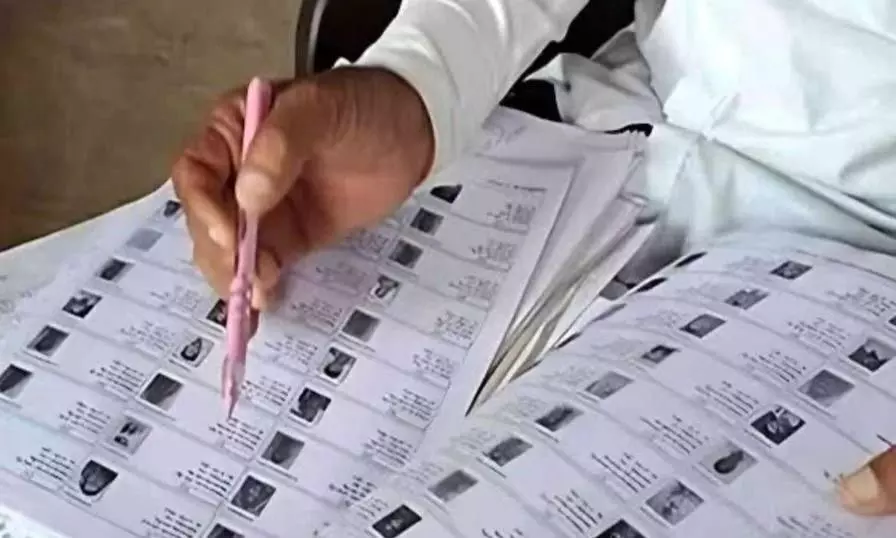
EC may kick off Bengal SIR from November first week
Senior EC officials are in Bengal to oversee groundwork and address logistical bottlenecks as the poll panel readies to launch its first SIR in over two decades

The Election Commission of India (ECI) has set the wheels in motion for the Special Intensive Revision (SIR) of electoral rolls in West Bengal, indicating that the exercise is likely to commence in the first week of November.
The poll panel has set a deadline of October 15 for all preparatory tasks for the SIR to be completed, hinting that the exercise might start in the state from November 2, sources in the office of the Chief Electoral Officer (CEO) said.
Also read | EC team to review Bengal poll readiness amid tensions with Mamata govt
An indication in this regard was given at a high-level meeting held in Kolaghat on Thursday (October 9), where senior EC officials met with Booth Level Officers (BLOs), Electoral Registration Officers (EROs) and Assistant EROs from the districts of East Medinipur, Bankura, and Jhargram.
EC team reviews groundwork
The message from the Election Commission was clear that the groundwork must be done not just on paper but through comprehensive field verification to ensure a clean, accurate, and inclusive voter list.
“The goal of the SIR is to ensure accuracy in the voter list. All officers must complete their tasks within the stipulated timeframe; there will be no room for irregularities,” a senior EC official was quoted as saying by sources present at the meeting.
In a move that underlines the importance the poll panel is placing on the SIR, a delegation from Delhi comprising Deputy Election Commissioner Gyanesh Bharti, Director General (IT) Seema Khanna, Deputy Secretary Abhinav Agarwal, among others, is reviewing the SIR preparation in the state since Wednesday (October 8).
The team held meetings with district magistrates across the state, issuing firm instructions that all pre-SIR logistics, including the issuance of public notices and distribution of application forms, must be wrapped up by October 15.
Treading cautiously after Bihar
The team also outlined the operational roadmap, pointing out that over 15 crore forms are to be printed for distribution among the state’s approximately 7.65 crore registered voters.
Each voter will receive two copies -- one to retain and one to return to the BLO. Once soft copies are provided from Delhi, printing will begin locally in each district rather than centrally, as was done in Bihar. The forms will then be delivered door-to-door by BLOs.
The EC is treading with caution, drawing lessons from the missteps during the SIR process in Bihar, which was plagued by complaints and administrative lapses. Several Bihar officials faced disciplinary action following the controversies, and the poll panel is determined to avoid similar pitfalls in West Bengal.
Notably, while Bihar last conducted its SIR in 2003, West Bengal’s previous revision dates back even further to 2002, highlighting the urgency and significance of the upcoming exercise.
Officials noted that this revision would serve not just to update the rolls but also to cleanse them of ineligible or non-citizen entries, ensuring that only eligible Indian citizens can cast their vote in the 2026 Assembly elections.
Teachers flag workload concerns
While the poll panel is racing against time to initiate the process, it has run into resistance on the ground, especially from government school teachers who double up as BLOs. At Wednesday’s meetings held in Rajarhat Gopalpur and New Town, several teacher-BLOs voiced deep concerns about being “overburdened”.
With schools operating six days a week and many of them travelling long distances daily, managing both their teaching duties and the exhaustive door-to-door SIR responsibilities has sparked serious anxiety.
“I travel 108 km daily to and from school. With over 700 students to manage, how am I expected to handle SIR duties as well? Labour laws don’t permit more than eight hours of work a day,” a teacher reportedly said during the meeting.
Another painted a grimmer picture: “I’m the only teacher at my school, which is 70 km from my home. Managing both the school and SIR work alone is simply not feasible.”
Many of the teachers requested the EC to grant them a month-long leave from school during the SIR period to be able to fulfil their election duties effectively.
Tech meets ground reality
Acknowledging the gravity of these concerns, CEO Manoj Agarwal stated, “Election Commission rules are uniform across India. Just as SIR was done in Bihar, it will be done the same way in Bengal. But we will look into the concerns raised, especially in cases where teachers are single-handedly managing schools.” However, no concrete decision has yet been taken on the leave request, leaving many BLOs in a state of uncertainty.
Also read | BJP leaders attacked, political tensions flare up in N Bengal amid rain disaster
In an attempt to address some of the logistical challenges, the Election Commission is also introducing technology into the process. Director General of the EC’s IT division, Seema Khanna, took a lead role during the Rajarhat meeting to explain the digital tools that will be used to streamline the workload.
“The data collection process will be streamlined using a mobile app that enables one-click uploads,” Khanna assured the BLOs. She also provided her personal contact details to the field officers, promising support and encouraging them to approach the task with commitment.
The digital mechanism is intended to minimise time spent on manual entries and improve overall efficiency. However, for teachers already stretched thin, even the best-designed app cannot substitute for the hours of on-the-ground verification that SIR demands.

